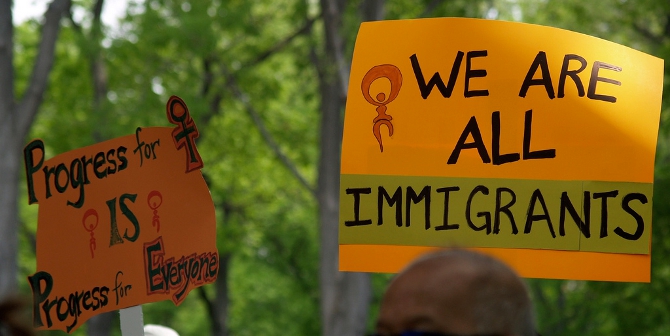 On Thursday night, in an address to the nation, President Obama announced that his administration would use its ‘prosecutorial discretion’ to grant a reprieve from deportation to undocumented immigrants who have been in the country for at least 5 years, have children who are citizens or permanent residents, and are willing to pay taxes. Catalina Amuedo-Dorantes writes that this action is similar to 2012’s Deferred Action for Childhood Arrivals memorandum in that it does not prevent the recently arrived from being deported, provide a path to citizenship or allow undocumented immigrants access to benefits. She writes that the measure will help undocumented immigrants by allowing many families to live in peace and without the constant fear of deportation, which may in turn allow them to contribute to the social and economic fabric of the U.S.
On Thursday night, in an address to the nation, President Obama announced that his administration would use its ‘prosecutorial discretion’ to grant a reprieve from deportation to undocumented immigrants who have been in the country for at least 5 years, have children who are citizens or permanent residents, and are willing to pay taxes. Catalina Amuedo-Dorantes writes that this action is similar to 2012’s Deferred Action for Childhood Arrivals memorandum in that it does not prevent the recently arrived from being deported, provide a path to citizenship or allow undocumented immigrants access to benefits. She writes that the measure will help undocumented immigrants by allowing many families to live in peace and without the constant fear of deportation, which may in turn allow them to contribute to the social and economic fabric of the U.S.
For some time now, it has been evident that the American immigration system is broken. A number of initiatives have been proposed and debated as a means to deal with the approximately 11.7 million undocumented immigrants. After the Development, Relief, and Education for Alien Minors (DREAM) Act failed more than a decade ago, states and local entities started to take matters in to their own hands, resulting in a plethora of inconsistent open door policies (such as the granting of in-state tuition for undocumented immigrants) and close door policies (as has been the case with 287(g) agreements, Secure Communities and state-level omnibus immigration laws, to mention a few). Deportations reached an all-time high during the first term of President Obama, leading to an increasing number of controversies, including the undesirable separation of families. In June 2012, President Obama announced that his administration would practice prosecutorial discretion for individuals meeting a set of criteria very similar to those proposed in the most recent version of the DREAM Act. Under that program –the so-called Deferred Action for Childhood Arrivals (DACA), individuals approved for consideration of deferred action were granted a renewable two-year reprieve from deportation proceedings and became eligible for work authorization in the United States.
This week, President Obama has indicated how, during the past year and a half, the Republican-run House has refused to take up a Senate-approved immigration plan that would address the various issues at the table, including: (a) the need to increase the number of visas available to high-skilled immigrants who wish to remain in the country after completing their graduate studies; (b) addressing the problem of undocumented immigrants living and working in the shadows; and (c) at the same time, ensuring the border remains secure. As the President has noted, it has become apparent that such an agreement will not be reached any time soon, particularly following the results from the recent elections. As a result, President Obama has announced that he will provide a reprieve from deportation to approximately 5 million undocumented immigrants who fulfill a series of requirements –including having been in the United States for at least 5 years, having native or legal permanent resident children and the willingness to come out of the shadows and paying any past due taxes.

Just as he did in 2012 with DACA, the President’s executive order does not offer a permanent relief from deportation or legal status –something that only Congress can confer. It does not provide a path to citizenship. It does not extend the reprieve from deportation to new entrants, who would actually face an increasingly militarized border. In fact, despite the requests from immigrant groups, the executive action leaves aside parents of undocumented youth brought to the United States as children –a painful realization to many of the youth who were granted reprieve from deportation and work authorization through DACA. Finally, just as DACA did, the President’s executive order continues to deny access to the healthcare system –what could be considered a questionable decision given public health concerns, and other social benefits to millions of undocumented immigrants.
President Obama has indicated that this is the only reasonable, thoughtful and compassionate way to address the ongoing deportations of non-criminal immigrants who came to the United States to realize the American Dream by working hard for a living. Indeed, the vast majority of these individuals either work or study. They do not qualify for welfare. They do not qualify for healthcare. And, still, they often contribute through fake social security numbers to the Social Security Earnings Suspense File that, eventually, reverts to funding the pensions of millions of Americans. The vast majority of their children are U.S. citizens who will study, work and contribute to U.S. society just like any other natives. President Obama has noted how mass deportation is not only unrealistic but, to the extent that these individuals are willing to take on the civic responsibilities of any other resident, seems intolerant and, furthermore, economically shortsighted.
The new executive order surely reopens the immigration debate. How will the temporary reprieve from deportation help? Unlike DACA, which limited to a large extent the pool of applicants to youths who had arrived to the United States prior to their 16th birthday, were under the age of 31 as of its announcement and were currently in school, had graduated from high school, obtained an equivalent degree, or had been honorably discharged from the Coast Guard or Armed Forces of the United States, the new order will extend the reprieve from deportation and work authorization to older immigrants, regardless of their educational attainment. Yet, at the minimum, the measure will, first and foremost, allow these families to live in peace and evade the constant fear of detention and deportation. To the extent that the children are native or legal permanent residents likely to remain in the United States, providing them with a safe environment in which they can grow up, study, feel secure and proud of their country only makes sense.
The growing number of deportations –the vast majority of non-criminals, has exacerbated the painful separation of families, led to falling incomes, housing and food insecurity, health and mental problems, not to mention drops in school grades and gang involvement of abandoned children. This is just too high of a price to pay when there is no criminal offense involved. Secondly, reprieve from deportation might also allow many of these individuals to come out of the shadows, permitting them to find better employment opportunities, start new family businesses, learn English better, and contribute to the social and economic fabric of the United States, just as many did after the 1986 Immigration Reform and Control Act (IRCA).
Please read our comments policy before commenting.
Note: This article gives the views of the authors, and not the position of USApp– American Politics and Policy, nor of the London School of Economics.
Shortened URL for this post: http://bit.ly/1HuqI9B
_________________________________
 Catalina Amueda-Dorantes – San Diego State University
Catalina Amueda-Dorantes – San Diego State University
Catalina Amuedo-Dorantes is a Professor at the Department of Economics, San Diego State University, California. Her primary research area is labor economics, with a focus on contingent work, immigration policy, undocumented immigrants and remittances.






